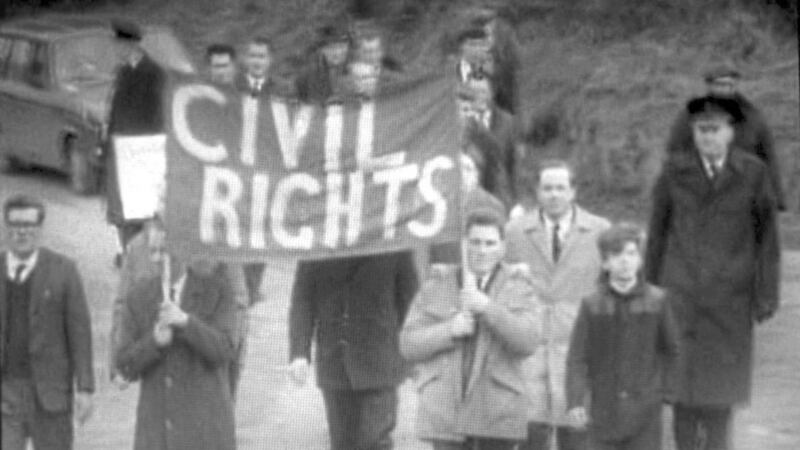As everyone knows, want to or not, almost every day here is anniversary to some milestone or horror but these present years pile up big dates.
This season’s background soundtrack is the arrival of the full-blooded civil rights movement. An allergy to summer schools maybe screens out new perspectives as well as old obsessions but the long-ago foundation stones demand attention: the Easter Rising, the establishment of the Northern Ireland state.
Between those two came the steady shift in beliefs showcased in ‘On this Day’ on the opposite page. The Irish News of 1918 lamented John Redmond and bishops deplored the rise of Sinn Féin though slightly less exercised than two years earlier by the ‘traitors’ who stabbed the King’s army in the back. The molten state of public opinion meant testing years for the north’s Catholic paper.
Civil rights agitation fifty years ago also taxed a society still authoritarian to the core, within though separate from a similarly rigid unionist state. Most commemoration sounds light on that aspect, geared mainly to honour predecessors. Piety and reverence tend to strip out history’s rough drafts.
Some today may well not know that 1967’s agitation had a kernel of Catholic professionals (later a type dubbed ‘upwardly mobile’), doctors and their wives (not so many female doctors then) a few lawyers, pharmacists. Some had more care for their roots and stronger social consciences than others. The 11-plus cohort was not quite the first appearance of chippy Catholics with degrees. A powerful, shared grievance was that the medical world was dominated by Queen’s-trained, RVH-employed specialists and consultants, often Masons. The Mater was a Catholic fiefdom, but minus prestige and resources.
1968’s events brought players with different priorities, short on respect for their elders, hearing echoes from Paris, the US. Bernadette Devlin, Eamonn McCann, Michael Farrell had variously worked-out socialist ideologies, Bernadette the genius speaker though McCann had inspired moments and Farrell could hold a crowd. Older protesters sometimes watched them with dismay.
They all three wrote with innate talent, Farrell’s later works of history lending substance to the personal style the other two conjured with.
Some of their peers followed them on to the streets, most let adolescence (no ‘teenage’ then) carry them/us into adult life in a place coming apart at the seams.
Listening now to complaint of argument being ‘divisive’, almost always from unionists, and pompous verdicts of ‘increased polarisation’, indeed ‘unprecedented polarisation’, is a trial. This was a place of separate communities through the 20s to the 70s. As it is now and possibly will always be, amen.
One of the strongest propulsions to get out and away from that perpetual battened-down segregation came in 1968, the year now being memorialised. While the temperature rose (as it had between 1916 and ‘19), clans closed in and personal choices steadily shrank, some older siblings in big, traditional republican families fled. Others hung on until the start of the increasingly bloody ‘70s. As Paisleyite rallies blocked civil rights marches and a unionist government lost its grip, what drove away the young who had just left school and the lucky minority (as it then was) who had got a university place and just graduated was often dread. But there was also disappointment. Some in that generation had imagined bigotry was dead.
When a mother or father said no indeed you cannot go to the dance in the Protestant hall, they wouldn’t let you in anyhow, some scoffed and tried and found it was true. Some were marched home by their Protestant neighbours, who had their own wayward children to control. Otherwise there might have been mixed marriages; and where would that end? When grandparents began to go back over their worst memories, being burnt out, bullets whistling down the entries, murder gangs led by policemen, the young said ah no, stop, tales to scare us into line.
Those who left ahead of the tide included young Protestants. Some had marched in the first days, perhaps looking to Madge Davison and Edwina Stewart as well as Bernadette the spellbinder. (Madge died young, uncelebrated, a working-class Protestant socialist more substantial than David Ervine.) A few stuck it out. Others backed away into a defensive, mocking unionism that said ‘Come on, this was never South Africa.’
We talk about northern nationalists now. It was just ‘nationalists’ then. Fifty years is not yesterday. Let us hope no more gay activists want unionist apologies for past behaviour as well as decent manners, or we’ll be here all day.








